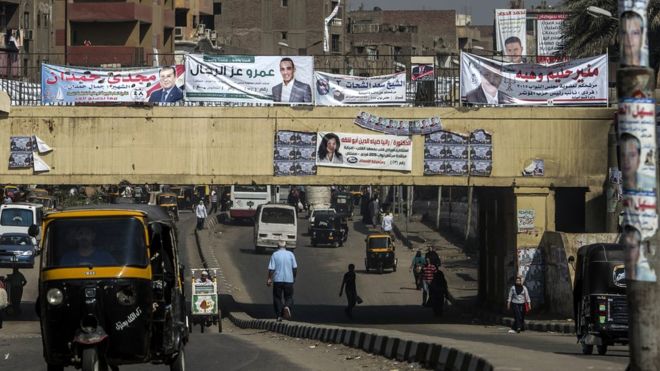Egyptians are set to vote for a new parliament that which will have more constitutional powers than before, in much-delayed elections.
But with most parties and candidates lining up behind the country's leader, will the House of Representatives just be a rubber stamp for President Abdul Fattah al-Sisi?
What are Egyptians voting for?
The House of Representatives, or Lower House, will comprise 596 MPs. Four hundred and forty-eight will be elected as independents, 120 as party-based deputies, with 28 appointed by the president.
Egypt has been without a parliament since 2012, when the Supreme Constitutional Court dissolved the Islamist-led Lower House, elected the year before.
Currently, President Sisi holds legislative powers until the new parliament is sworn in.
What's the turnout likely to be?
The turnout is likely to be low, with people suffering "election fatigue" after having been to the polls many times over the past four years since the 2011 revolution.
The banning of the Muslim Brotherhood and the jailing of activists and members has left many with little faith in the democratic process. Apathy is running high among young people, with many angry at the ruling government and its policies.
With revolutionary icons behind bars, they see little point in voting to maintain the status quo.
What's the likely outcome?
Nobody is expecting anything less than a resounding win for a parliament loyal to President Abdel Fattah al-Sisi. While many candidates are standing as "independents", they're likely to be loyal to one of the coalitions which will dominate the new parliament.
The pro-Sisi, centre-right For The Love of Egypt coalition is likely to dominate. Another pro-Sisi coalition expected to win seats is the Egyptian Front, led by former President Hosni Mubarak's former premier Ahmed Shafiq.
With the Muslim Brotherhood now banned, Al-Nour is the only Salafist party standing, and they are avowedly pro-Sisi. Few left-leaning or secularist candidates have any chance of winning seats.
How much power will the new parliament have?
The legislature will have more influence on state policy and budgets than previous governments. It also has the power to approve or veto any prime minister appointed by the president, and may approve a motion of no-confidence in President Sisi with a two-thirds majority.
But in reality, a lack of effective opposition means that the president will have no major cause for concern from MPs, and the legislature is likely to be a rubber stamp for his policies.
Is democracy being restored in Egypt?
The election comes at a time when Egypt seems to have anything but a thriving political life, in stark contrast to the momentum seen prior to the first post-uprising legislative election in late 2011. There's also the spectre of a pro-Islamic State insurgency in the Sinai region.
There remain concerns about restrictions on freedom of expression and right to assembly in Egypt, as well as a low level of tolerance toward opposition to the president.
The six-week poll is likely to result in a "tamed" parliament comprising pro-Sisi coalitions and independents, scattered blocs of political parties, and Mubarak-era figures, all with little true influence.
(BBC)
www.ann.az
Follow us !











